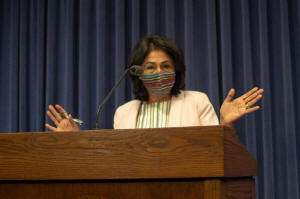Future of new congressional maps uncertain on final day of veto session
 Send a link to a friend
Send a link to a friend
[October 29, 2021]
By PETER HANCOCK
& JERRY NOWICKI
Capitol News Illinois
news@capitolnewsillinois.com
 SPRINGFIELD – Illinois lawmakers appeared
to be hitting some roadblocks Thursday in their effort to reach
agreement on a new set of congressional district maps on the final
scheduled day of their fall veto session. SPRINGFIELD – Illinois lawmakers appeared
to be hitting some roadblocks Thursday in their effort to reach
agreement on a new set of congressional district maps on the final
scheduled day of their fall veto session.
During a meeting of the Senate Redistricting Committee on Thursday
morning, Senate President Don Harmon, D-Oak Park, said he expected the
latest draft to be put into bill form later in the day. But he also said
he expected that bill to be introduced first in the House, and as of
midafternoon Thursday the House Redistricting Committee had not
scheduled a meeting.
Just before 5 p.m. Thursday, House Redistricting Committee Chair Lisa
Hernandez, D-Cicero, declined an interview request with Capitol News
Illinois, noting she was working with fellow lawmakers.
“I don’t know yet,” she responded when asked if the maps would pass
Thursday night or be delayed until January.
Part of the problem lawmakers face is the fact that, under the Illinois
Constitution, any bill passed after May 31 cannot take effect until June
1 of the following year, unless it receives a three-fifths majority in
both chambers. That’s 71 votes in the 118-member House, and 36 votes in
the 59-member Senate.

Democrats currently hold 73 votes in the House and 41 votes in the
Senate, but a consensus on what district lines would be acceptable had
not been reached thus far.
Crain’s Chicago Business reported Thursday that one option being
discussed would be to wait until January, when it would take only a
simple majority in both chambers to approve the maps.
That, however, would leave lawmakers with only a very short window in
which to approve the new maps. That’s because Jan. 13 is the first day
candidates can begin circulating petitions to qualify for the primary
ballot, according to a spokesman for the Illinois State Board of
Elections, and those petitions must be submitted to the board no later
than Monday, March 14.
House and Senate Democrats released their latest draft of a proposed set
of maps late Wednesday night. Although it was largely similar to earlier
drafts, the newest draft would pit three pairs of incumbents against one
another in the 2022 primaries, should they all choose to seek
reelection.
In southern Illinois, which saw the most dramatic population declines
since the 2010 census, Republican Reps. Mike Bost, of Murphysboro, and
Mary Miller, of Oakland, would be paired together in a new 12th
District.
In central Illinois, Republican Reps. Darin LaHood, of Peoria, and Adam
Kinzinger, of Channahon, would face each other in a 16th District
primary.
And in the western suburbs of Chicago, Democratic Reps. Sean Casten, of
Downers Grove, and Marie Newman, of La Grange, would face off in a 6th
District primary.
The plan would also create a second Latino influence district in a new
4th District that would include portions of Chicago’s Northwest Side, in
neighborhoods such as Melrose Park, Stone Park, Franklin Park and
Northlake.
[to top of second column]
|

Rep. Lisa Hernandez, D-Cicero, speaks at a state
Capitol news conference earlier this year. Hernandez, chair of the
House Redistricting Committee, said she was unsure if new
congressional maps would pass Thursday. (Credit: Capitol News
Illinois file photo by Jerry Nowicki)

Some people who spoke during that hearing expressed
disappointment with the latest draft, including residents of what is
currently the 3rd District on Chicago’s southwest side.
In 2020, Newman edged out then-incumbent Rep. Daniel
Lipinski in the Democratic primary in that district and went on to
win the general election. The latest proposal, like both other
drafts before it, would put much of that district into a new 6th
District, but the latest draft would pit Newman in a primary against
Casten.
William Beaulieu and Clare Duggan, both members of a group called
Coalition for Change IL3, said that group was formed, in part, to
unite the diverse communities and bring about change in the 3rd
District.
“We are politically active, we are involved. And we were unhappy
when the coalition was formed with our current representative
because of almost a complete lack of communication and opportunity
for input,” Beaulieu said.
Members of that coalition have testified at nearly every public
hearing about new congressional maps since the hearings began in
early August, and Duggan said many of them had submitted their own
proposed maps through the Democratic caucuses’ mapmaking web
portals.
Despite that, Duggan said, while the latest draft would keep more of
the current 3rd District intact than previous iterations,
significant parts of the district would be broken off into other
districts.
Under questioning from Republican senators, Harmon said the proposal
was based on “the totality” of input that legislative leaders
received from the public as well as other sources, including private
communications with staff from various congressional offices.
“We are not obviously adopting one person's map and presenting it as
our own,” Harmon said. “We are taking input from all sources and it
is reflected in the maps presented to the Senate.”
The Illinois congressional delegation is currently split 13-5 in
favor of Democrats. According to the nonpartisan Princeton
Gerrymandering Project, the latest plan would create 13
Democratic-leaning districts, three Republican-leaning districts and
one competitive district with a slight Democratic edge.

That could prove important nationally for Democrats who are expected
to lose seats in the 2022 midterms, and possibly their slim majority
in the U.S. House.
Capitol News Illinois is a nonprofit, nonpartisan
news service covering state government and distributed to more than
400 newspapers statewide. It is funded primarily by the Illinois
Press Foundation and the Robert R. McCormick Foundation. |